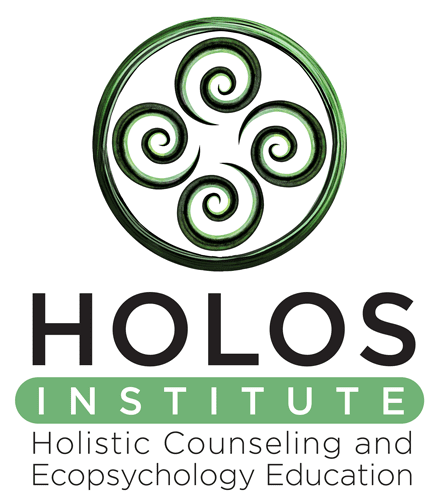Holos Ecopsychology Certificate Program 2019
RECOVER your wild heart and mind,
RESTORE your connection to Nature,
BECOME a guide for others in
RECONNECT and discovering RESILIENCE !
“If the world is to be healed through human efforts, I am convinced it will be by ordinary people, people whose love for this life is even greater than their fear. People who can open to the web of life that called us into being.” – Joanna Macy
The crises of our unprecedented times need leading edge solutions. Psychology can play a part in helping to change attitude, perception and behavior. The most appropriate form of psychology is one that reconnects the human animal with the rest of life on earth. Holos has been a touchstone resource for applied ecopsychology and has now developed a comprehensive, 100 hour training program that draws on the wisdom of many pioneers in the field of ecotherapy, ecopsychology, The Work that Reconnects, Permaculture and more. Come learn with leaders in the field as you develop community, delve into a range of ecotherapy practices and prepare yourself to lead others and offer solutions to the fundamental needs of our time. This program is deeply experiential, transformative and informative!
100 CEUS will be available for MFTs, LCSWs, as well as psychologists and RNs (approval pending).
We are currently planning the 2020 program
The dates are:
Sunday, April 19 – Friday, April 24, 2020
Thursday, May 21 – Monday, May 25, 2020
Friday, September 4 – Tuesday, September 8, 2020
residential retreats will take place at the Bell Valley Retreat Center in Boonville, CA (USA)
with 10 2-hour webinars
The application process starts September 15, 2019
THE PROGRAM
The 2019 program is composed of 3 thematic modules, each with a 4-6 night residential components with an additional ten 2 hour online webinars. It also includes one-on-one mentoring sessions and a capstone project.
The program launches on THURSDAY APRIL 4, at the EARTHRISE RETREAT CENTER in Petaluma, CA with an introductory seminar, overview and history, followed by the weekend long conference that offers a myriad of perspectives and ending with a daylong permaculture workshop. Two long immersives follow over the next 5 months with 10 webinars in between along with individual mentoring sessions and a summer capstone project. Please see the schedule and curriculum for more details.
The training will prepare participants to deeply understand and translate the framework of ecopsychology in a range of applications, including traditional clinical psychology settings as well as in community leadership, eco-therapy practices and creative endeavors. At the completion of the program, participants will be certified by Holos Institute, a leader in ecopsychological practices, to confidently offer ecotherapy and eco-based healing practices in the greater community. This program is geared toward clinicians but is also open to other healing arts professional or people interested in translating a nature-based connection into positive action and/or healing.
The program will cover, in-depth, the concepts and principles of ecopsychology, the origins of the field, and many of the intricacies of its clinical application both within a traditional, in-office setting as well as in outdoor therapy. We will be looking at the psychology of individuals from archetypal patterns to developmental, somatic and attachment theory lens. We will also be addressing the ever growing need to meet the anxiety and grief of climate change and environmental degradation.
We hope that this program will also inspire participants to become community/environmental leaders in a creative and heartfelt way meeting the concerns that are arising in the current planetary situation. The program is a blend of didactic learning processes along with deeply experiential components that help to integrate the learning more deeply and ground the material in a profound personal experience.
The immersive part weeklong residentials will build on previous ones as this very special cohort of trainees bond and have exceptionally deep time with the land. The first residential intensive is wrapped around the annual conference with workshops exclusive to the certificate program on either end of the conference weekend. The last 2 intensives will be held in a vast valley in Mendocino County where the wildness of the land invites the wildness of the psyche. This certificate program is unique in that it is not representing one viewpoint but rather engaging many diverse voices whom all speak passionately about caring for our planet.
We have enlisted an incredible community of elders and spokespeople who are leaders in ecopsychology and environmental stewardship. The program will be lead by seasoned clinicians who offer their personal insights into ecotherapy, ecopsychological approaches and earth-based practices applicable to both individuals and groups, but it also offers the wisdom of many other great teachers, inviting their wisdom in-depth.
These will include:
- Permaculture with James Stark
- Original leaders in ecopsychology thought, Craig Chalquist
- Joanna Macy’s Work that Reconnects with Mutima Imani and Constance Washburn
- Environmental racism and cultural considerations with Mutima Imani and Reene Soule
- Hakomi/eco-somatic processes with Rob Fisher and Hu Ting Ting
- Somatic and movement in nature with Jamie McHugh
- Narrative Cartography with Shmee
….and numerous other pioneers leaders in the field of ecopsychology.
The program has been created and curated by Mary Good, MFT and Jan Edl Stein, MFT and they are the primary organizers/instructors and general guides through the experience.
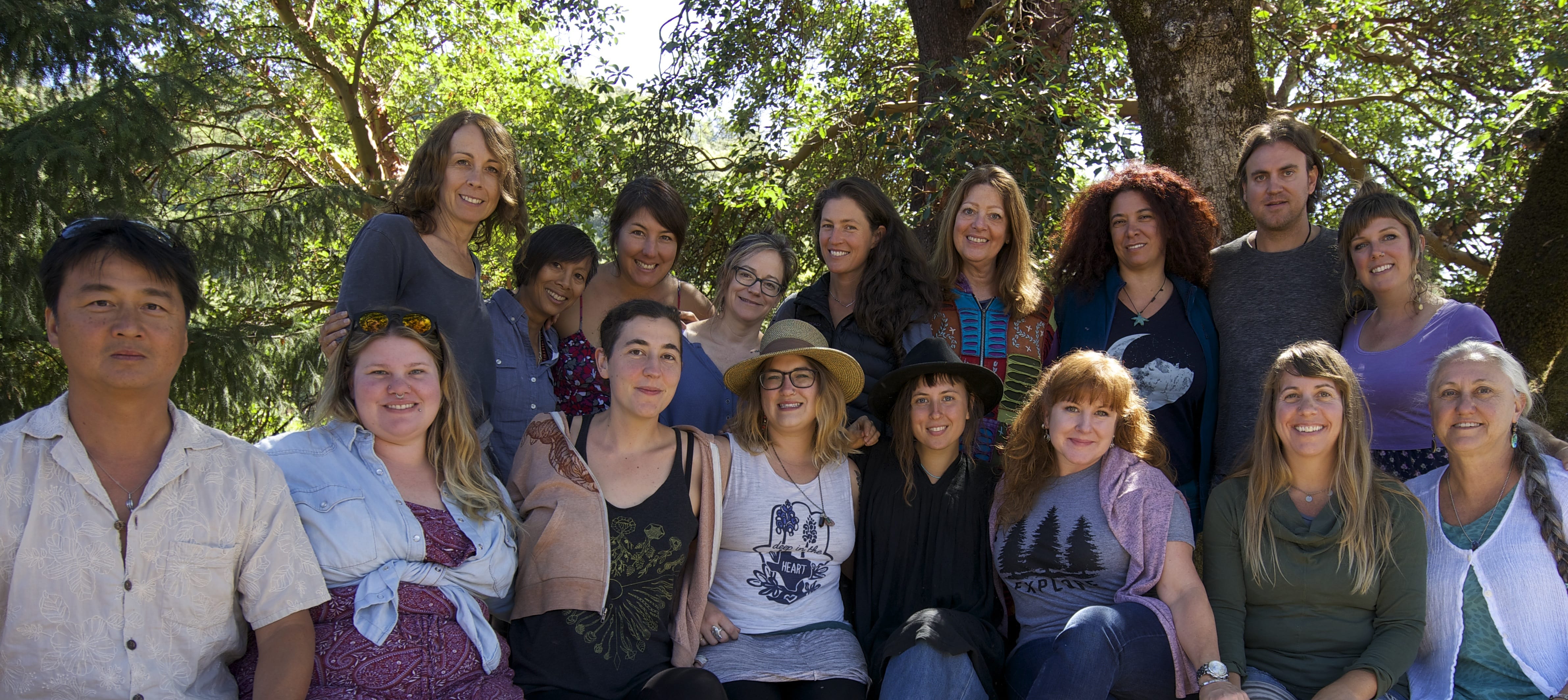
Our 2018 pioneer cohort was an incredibly dynamic group of heartfelt people with a range of diverse backgrounds. They deeply bonded and reported transformational experiences and some life-altering choices as a result of the program. See and hear about their experience in their own words:
“The eco-psychology certification program through Holos institute was a deeply transformative and healing experience for me. Personally and professionally, through each module, I found myself in a deep process with my own psyche and heart, the land and creatures, and the well chosen and thought-provoking readings. The many teachers that joined in the retreats and in the webinars provided a stalwart framework from which to step onto my own path as one who can both offer eco-therapy practices and healing to my clients, but also as an awakened way for me to relate to my own community and local environment”… Shannon Rogge LMFT
“Holos’ EcoPsychology program created a profound shift in my life’s work. As an outdoor guide and leader, I strive to connect people to our natural world through seeing with new eyes, opening other sense portals and creating spaces that are connective, open and reciprocal. I didn’t know how deep you could go with this work until this program! I learned so many tools on how to speak directly to the wild animal-self that lives deep within all of us. We are truly wild beings and we know it, we just need a little help from experienced leaders that know how to access the language of that wild self. Through this program I learned how to speak that language and now feel confident in leading people into a deeper connection to nature, providing a broader view of what it means to truly be a peaceful, helpful guide for others in this Great Turning that is upon us at this pivotal moment.” …Caitlen D.
APPLICATIONS FOR THE 2019 PROGRAM IS NOW CLOSED This program is intended for people who are actively engaging in direct human contact as guides, therapists, counselors, coaches for transformation and healing or people who are preparing for such. We will consider any applicant who exhibits a sincere desire to embrace ecopsychology in their chosen field of study or profession. Our very successful 2018 cohort was composed of psychotherapists, (both licensed and pre-licensed), coaches, educators, herbalists, wilderness guides, counselors, social leaders, and students. Parts of the program will deeply reference clinical psychological topics so any applicant needs to be aware and comfortable with this. We accept students on a rolling basis and will close applications once we meet the maximum cohort size of 18. Exceptions to this limit will be carefully considered for rare circumstance.
We encourage early application to ensure being considered before our quota is met. Applicants requesting work/trade discounts are encouraged to apply as early as possible as discounts are offered on a first-come/first-served basis from our limited reserves. Your application is considered complete when we receive both this online application form and your payment.
The application is our way of getting to know you to see if this program is a right fit. Your answers will only be read by Jan Stein and Mary Good and are kept strictly confidential. If you have any questions or want to clarify something please feel free to reach out to us via email (events@holosinstitute.net) or phone (415.751.1307 – Jan’s direct line). We may contact you if we have any additional questions of you or require supplemental material such as references. By applying you acknowledge that you understand the program curriculum and are comfortable with the level of clinical material that will be presented. You may expect to receive a response within 2 weeks of our receipt of your completed application.
Thank you! We are excited to offer this incredible program and so welcome your interest!
THERE ARE 2 STEPS TO APPLY: 1) Pay the $75 application processing fee (non-refundable)
[gravityform id=”8″ title=”true” description=”true” ajax=”true”]
This program is geared toward clinicians but is also open to other healing arts professional or people interested in translating a nature-based connection into positive action and/or healing. The program will cover, in-depth, the concepts and principles of ecopsychology, the origins of the field, and many of the intricacies of its clinical application both within a traditional, in-office setting as well as in outdoor therapy. We will also be addressing the ever growing need to meet the anxiety and grief of climate change and environmental degradation.
We hope that this program will also inspire participants to become community/environmental leaders in a creative and heartfelt way meeting the concerns that are arising in the current planetary situation. The program is a blend of didactic learning processes along with deeply experiential components that help to integrate the learning more deeply and ground the material in a profound personal experience. The program is structured in 3 modules, each with it’s own residential intensive. Each module will include a 5 or 6 day residential, experiential and didactic process where we may all deepen into the work.
Students are also asked to produce a capstone project and offer a brief presentation of it to the cohort. The project can be anything from reflections of an ecotherapy practice, reflections of working with a group or individuals applying the principles and techniques learned, a research paper, or a personal reflection.
There will be both required and recommended reading.
Additional webinars covers more topics and deepens some of the processes of the residential retreats. Webinars will be held on alternate Saturday mornings (10:00 am – noon PST) . There are 10 webinars total. Students will also have 2 one-on-one meetings with an ecotherapist practitioner over the summer to help refine their individual relationship to the work.
Module1: Ecopsychology Fundamentals The basic orientation of ecopsychology. We will offer an overview of the history and theoretical underpinnings. The intensive (4.5 day/4 night) will include an intensive workshop with Craig Chalquist, a sampling of interpretations (via the Ecopsych Conference), and a daylong workshop in permaculture principles introduced by James Stark at the Regenerative Design Institute. 3 2-hour webinars will fill in and “connect the dots” of this rich information.
Module 2: Applied Ecopsychology, EcoTherapy, and Eco-Resilience Clinical applications both in and outside of the office, clinical considerations and techniques and practical guidance of eco-therapy practices including naturalist knowing for guides. This intensive (7 day/6 night) will offer an in-depth workshop on applications of eco-psychology in the therapy room, practices of eco-therapy, considerations of moving the clinical container outdoors, practical “nuts and bolts”, somatic processes in nature based therapy and deepening into relationship with the natural world for the practitioner. It will also include a voyage into practices that support hope and resilience, sustainable and inspiring practices that connect and build psychological, spiritual and sensate practice integration. We will look at a number of approaches that offer support and processes for climate change anxiety and grief most most notably, Joanna Macy’s “The Work that Reconnects”. We will consider practices and attitudes of many cultures and discuss diversity and social justice.
MODULE 3: Practice Integration Grounding applications into practice including creative/art for ecotherapy, somatic considerations and work with the creative unconscious.We will also review with each student the ways that they plan to take this work into the world. This will also be a period of reflection and integration of all that has been learned including a sunrise to sunset solo time on the land with a mindful council for sharing.
The first residential will be hosted at the Earthrise Retreat Center of the Institute of Noetic Sciences. Local students may elect to not stay overnight on campus or may chose to find alternative accommodations. The following 2 residential modules will be hosted at a Bell Valley Retreat Center, in the rolling hills of Mendocino County where on 650 areas of land we will have deeply stimulating didactic processes interspersed with nature-based experiences on the land to digest and integrate the material. These residential experiences will allow us to go deep, bond as a group and allow space for personal reflection. The retreat center is a rustic/elegant space that is very well appointed and incredibly comfortable and inviting. We will share meals in an elegant turn-of-the-century farmhouse and enjoy meeting in a spacious hill top yurt with many hiking trails, a swimmable pond, and many more delightful surprises. The 10 interspersed webinars will offer a format for digesting the rich material from the residential modules as well as introducing some new teachers and exploring new ideas in the field.
The webinars presented in the 2019 program were as follows:
1) April 20 Digesting the conference: Jan & Mary
We’ll decompress from the fullness of the first residential, refine some of the student intentions and offer some beginning personal practices for the program.
2) May 5 Practices That Connect: Jan Edl Stein, MFT
A consideration of ways to invite humans to be more present in their interactions in the natural world. We’ll include pathways of connection that are individual and shaped by culture, ancestery and personal history.
3) June 1 Taking the Clinical Container Outdoors – more considerations: Jan & Mary
Review of ecotherapy practices taught in last residential retreat and feedback from student practice sessions. We’ll “fine tune” the art of facilitating ecotherapy and nature connection.
4) June 15 Working with Groups – Group Dynamics and Practical Considerations: Jan & Mary
Most ecotherapy and ecopsych offerings are with groups. We’ll look at some very practical considerations in working with groups, forming workshops, etc., as well as dig into the psychological dynamics of groups. We’ll also examine why there is not a “one size fits all” for ecotherapy and considerations in working with marginalized populations.
5) June 22 Hakomi and ecotherapy 1 – tracking :Rob Fisher, MFT
This is one of a 2-part Hakomi style approach to nature-based counseling.Tracking is the act of noticing the outward signs of internal experience and the observation of core models of the world as they appear in behavioral indicators and present experience. This is not an interpretive method, but stays close to actual, real time experience.
6) June 29 Hakomi and ecotherapy 2 – Contact Processes- Rob Fisher, MFT
Continuing to build on the previous webinar, we’ll look at ways to invite a client into mindfulness with particular consideration of nature-based practices.
7) July 13 Environmental crisis as initiation: Renee Soule, PhD
Renée will share findings of her doctoral research that reframes ecological crises as an initiation. Her specific focus is the development of a “post-modern ecological identity” that can emerge when turning to address ecological challenges directly, honestly, and wholeheartedly. Can serving life be a path of healing and personal development? Her research reveals that yes, this is possible–but not guaranteed. Knowing the territory of initiation helps navigate the challenges of jettisoning outmoded survival strategies and learning to live in alignment with the power and wisdom of nature. Reframing crisis as an initiation is a powerful ool for practitioners devoted to personal and ecological healing—especially now. Creative action on behalf of life can, and perhaps should, become a crucial dimension of a thriving ecopsychology praxis.
8) July 27 Decolonizing your ecotherapy practice: Mary Good, MFT
We’ll take a hard but compassionate look at the practices we take for granted that are actually cultural appropriations or racial/class assumptions and discuss ways to raise our awareness, sensitivity, and embrace a more respectable eco-practice.
9) Aug 10 Making Sanctuary in a Time of Demise: Bayo Akomolafe, PhD
We are collectively immersed in a difficult time of transience, and it is hard to make sense of what to do next or how to respond to a crisis that feels unprecedented in its magnitude. In this webinar, Bayo suggests that how we respond to the crisis is part of the crisis, and conjures a ‘postactivist’ thesis that draws from ecopsychological, ecofeminist and posthumanist frameworks: one which invites a different sort of attending-with (or with-nessing) and being hospitable to more-than-human forces we have historically refused to consider as vital, agentially alive, and powerful in their contributions to how the world comes to matter.
10) Aug 24 Towards a Green Death: Mary Good, MFT
How can we consider our deaths and post-death body outcomes in a way that is ecologically aware? Part of the webinar will be the group engaging in a “death cafe”.
Note: The program and faculty are subject to change as instructor schedules shift and new instructors join us.
The 2019 Schedule is as follows (Pacific time) Content highlights outlined here (the actual program is very rich with many extras added)
Residential 1 at Earthrise Center, Petaluma
Thursday, April 4
4:00 pm Gather, introductions and intentions
Friday, April 5
10:00 Mary Good – Ecopsychology Principles and History
2:00 Craig Chalquist – Imaginative Ecopsychology: Places of Reenchantment
A discourse of gloom and disaster has not convinced the public to become more sustainable. What if ecopsychology, depth psychology, and storytelling joined up to restory our relations with ourselves, each other, the places we call home, and our still-beautiful planet? We might call this terrapsychology, a reconnective approach rooted in inspiration and allurement. Hear about a playful psychology of reenchantment for living in an animate world: a deep psychology not only of humans, but of everything we interact with.
Saturday, April 5
Sunday, April 7
Ecopsychology Conference
Monday, April 8
Commonweal Garden, Bolinas
James Stark – Permaculture and the Ecology of Leadership
to Monday, April 8, 3:00 pm Introductions and Orientation General principles and concepts in ecopsychology History of Ecopsychology Terrapsychology EcoPsychology Conference Permaculture workshop
Residential 2 in Mendocino Co. Thursday, May 16 2:00 pm through Wednesday, May 22 2:00 pm Opening ceremony, honoring the land and history Natural history for ecotherapists EcoTherapy techniques, clinical considerations, logistics, addressing trauma Somatic practices and awareness in ecotherapy Ecotherapy considerations in diverse cultures Working with Climate change grief and anxiety The Work That Reconnects
Residential 3 in Mendocino Co Thursday, August 29 2:00 pm through Tuesday, September 3 2:00 pm Capstone Project Presentations Exploring the Inner Landscape and Utilizing Liminal Spaces Narrative Cartography: Shmee Constructing Rituals and Deep Group Processes in Nature Solo Time on Land with Council Sharing Integration and Closing Ritual
WEBINARS dates of 2019 webinars TBA. All will be on Saturday mornings 10:00 – 11:45 am. These are recorded live and made available to students who need to miss a webinar.
Current list of topics are: (Subject to change)
Practices that Connect Us to Nature: Jan Edl Stein
Taking the Clinical Container Outdoors – more considerations: Jan Edl Stein and Mary Good
Working with Groups – Group Dynamics and Practical Considerations: Jan Edl Stein
Reciprocity in Ecotherapy: with Linda Buzzell
EcoMythology: Craig Chalquist
Environmental crisis as initiation: Renee Soule
Environmental racism / White privilege / Inclusivity in ecopsychology, TBA
Ecoresilience and Environmental/Social Justice: Mutima Imani
Towards a Green Death: Mary Good
Mentoring: Two individual meetings with an ecotherapist mentor scheduled privately over the summer.
Final Project: Each student is expected to complete a project that reflects some aspect of how they will integrate the program into their work. The may be a research paper, designing a group eco-program, practice with individual ecotherapy, a personal reflection project, etc. These capstone projects should be completed over summer.
Our April intensive will be hosted at the Earthrise Retreat Center in Petaluma, CA which is part of the Institute of Noetic Sciences. Residence at the center is optional for locals who wish to save as a commuter for this weekend. We will have rooms reserved at the center for Thursday through Sunday night. Retreat center lodging is standard hotel style rooms with 2 twin beds. There is an option to reserve a single room is desired (for a single supplement fee). You may get a sense of the lodging at Earthrise by following this link http://noetic.org/earthrise/accommodations/lodging You are also free to find local accommodations in lieu of staying at the center.
Please note that ALL students are required to attend AT MINIMUM the orientation session and dinner on Thursday evening, April 4 as well as the Friday 9 am -6 pm. Saturday 9 am to 9:00 pm, Sunday 9 am to 5 pm, Monday 9 am to 3:00 pm.
Our Spring (May) and Summer (Aug/Sept) intensives will be hosted at a the Bell Valley retreat center outside of Boonville, CA, which includes over 650 acres of rolling grasslands, expansive views and extensive trails amidst a rich and bio-diverse ecosystem in the rolling inland hills in the lovely Anderson Valley of Mendocino County.
In this setting our intensives will invite our senses to expand and for the group to drop into a very deep experience of themselves in relationship to the landscape while being supported by a truly exquisite variety of accommodations There are a variety of accommodations. These range from an elegant farm house to more rustic rooms. Some are close to the main house/dining room and some are more remote. All are very comfortable and beautifully furnished. Visit the center’s website for more details.
There is a supplement for any weekend to upgrade to a private room. We will do our best to provide preferred accommodation type and will encourage everyone to try out different rooms during the residentials. Lodging varies between: Permanent “glamping” tents on gorgeous rolling hills with bathroom access a short walk from the tents. Upstairs in a classic country barn with shared half bath and short walk to shower house. Bunk beds in spacious octagonal building with own kitchen and full bath. Graciously restored four bedroom farmhouse. Some rooms with en-suite. Some folks may opt to set up their own tent on the land.
Our meeting space will be a lovely knoll top yurt, outdoor theater and many comfortable places to sit outdoors. The center has an extensive system of hiking trails and a swimmable pond. Delicious, organic and locally sourced meals (with many options for food preferences) will be shared in the main farmhouse dining room.
All webinars and most mentoring sessions will be managed from the Zoom platform. Participants need only a computer or tablet to connect into the conversation. In a pinch, even a phone connection will work. We will walk everyone through the process of setting this up but it is very easy. The intensives will require trainees to be present in person and, at least for the last 2 intensives, to stay overnight.
For the first intensive at Earthrise, students may stay on-campus the long weekend or local students may opt to commute. Others may chose to find their own accommodations in Petaluma or Novato (or nearby). However, commuters must plan on being present at the Thursday afternoon opening session and dinner, all day Friday (ideally for dinner as well), all day Saturday (including dinner), all day Sunday, all day Monday. It is not an option to commute to the 2nd and 3rd intensives at Bell Valley.
If you are using air travel to come to the bay area for the intensives, please speak with either Jan or Mary BEFORE booking your flights. We will help you sort out best times to arrive and transportation to/from either the San Francisco, Oakland or Santa Rosa airport. We will do our best to arrange carpools, and in the case of people coming in from outside the bay area, we help coordinate your transportation. One of our program assistants will be in touch with you to refine your travel plans. For the April intensive, there is excellent airport transit shuttle buses from either San Francisco or Santa Rosa airports and we will offer transportation from the Petaluma drop-off station to the retreat center. For the May and summer intensives at Bell Valley we will help students organize carpools to the retreat center.
You will be sent information well in advance of each intensive on how to prepare and what to bring, etc.
FEES The cost of this 100 hour program, including all lodging, meals, tuition and fees is $4,800 per person.
This does not cover travel expenses to each of the 3 residential modules. A non-refundable application fee of $75 is required to process your application. A non-refundable $600 deposit will secure your place in the program and is due within 2 weeks of acceptance. One half of the balance is due by Feb 1, 2018. The final balance is due April 1, 2018.
There are some discounts and add-ons as options:
Single lodging supplement – add $375 per each of the 3 residentials.
Commuter discount: If you can be a commuter at first, March residential at Earthrise (no lodging or breakfasts – BUT lunches and dinners included) – subtract $375. This option is NOT available for the 2nd and 3rd residential.
Work-Trade Discount: We ask that everyone pitch in to help – especially at the Bell Valley intensives. However, we do need students to offer extra support at Bell Valley around meal prep/clean-up and basic set-up needs and during the conference weekend there are various tasks that need filling. There are a limited number of work-trade discounts available and these are offered on a first-come-first-serve basis. (please inquire for details – there is a place on the application to indicate your need). Early applicants/requests will be offered a greater discount. As the requests increase and the application deadline approaches, the offer will decrease. Typically, early applicants who are willing to offer greater assistance at all 3 residentials may expect to receive a total discount of about $750 – 900. Late applicants/requests can expect no more than $500 – 600 in work/trade discount.
Payment Plan: If you need to break the fee into monthly payments we can offer monthly payment plan that breaks down the balance (minus the $600 deposit) into 7 equal monthly payments due on the first of each month Feb through August 2019. There is an additional processing fee of $10 per month/payment to use this extended payment option. Payments will be rounded up to the nearest whole dollar amount. There will be a 10% late fee assessed to any monthly payment received more than 5 days after the first of each month. Exceptions will only be considered (and not promised) in written agreement between Holos and the student.
PLEASE NOTE: We will do our best to make this affordable for candidates who sincerely want to attend. We are seeking outside funding to offer deeper scholarships and will work with you to make this affordable as reasonably as possible. Payments may be made via check, cash, PayPal or credit card.
Refunds/Cancellations
The $75 application fee and $600 hold deposit to reserve your space is non-refundable.
Anyone withdrawing from the program in writing before March 1, 2019 will be refunded 75% of any fees currently paid (minus the application fee and hold deposit)
Anyone withdrawing from the program in writing on or after March 1, 2019 but before April 1, 2019 will be refunded 50% of any fees currently paid.
Anyone withdrawing from the program in writing on or after April 1, 2019 but before May 1, 2019 will be refunded 25% of any fees currently paid.
Anyone withdrawing from the program in writing on or after May 1, 2019 forfeits any refund.
Anyone on a monthly payment plan who decides to “drop” the program at any point will not receive any refund.
*** There are absolutely no partial program attendance and fees. This program works as a whole and we have learned that attending only some parts is a great loss for the student and also damages the cohesiveness of the cohort.
Holos director, Jan Edl Stein, MFT and ecotherapist, Mary Good, MFT are the primary instructors, guides and developers of this program. Jan and Mary will lead and/or support all of the sessions while coordinating with an extraordinary cast of guest instructors. Below is a list of all of the currently confirmed instructors who will be providing in-person training. We have many more who are still in exploration who will either join us to be in person at one of the residentials or will participate in a webinar.
CURRENT PROGRAM INSTRUCTORS: 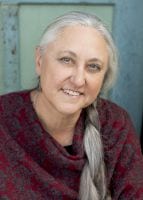
Jan Edl Stein, MFT is the director of Holos Institute as well as a licensed MFT in private practice in San Francisco and Marin. Jan is also Adjunct Faculty in East-West Psychology at the California Institute of Integral Studies (CIIS). Jan leads workshops and retreats that interweave meditation, active imagining, shamanic journeying and earth based contemplations. She has taught/presented at Sonoma State University, Grof Transpersonal Training Program, The Bioneers Conference, Esalen Institute, IONs, and numerous private venues. All of her work draws upon a lifelong study of spiritual traditions and healing practices of earth-based cultures and a deep love of the natural world. More information may be found at www.janedl.com.
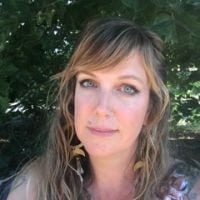 Mary Good, MFT is a holistic counselor, ecotherapist and certified California Naturalist. In her private psychotherapy practice, Mary helps her clients to reconnect with their inherent wholeness through mindfulness, somatic exercises, here-and-now awareness and compassionate insight. She loves to work with clients in outdoor sessions, with nature as her co-therapist. Mary seeks to inspire others to connect with Place, by getting to know their bioregion through natural and indigenous history, folklore and direct contact with the land and its inhabitants. When not in session, she enjoys writing, gardening, wildcrafting and tending her flock of 15 chickens. She lives in Sebastopol, CA with her husband and daughter. http://marygood.squarespace.com/
Mary Good, MFT is a holistic counselor, ecotherapist and certified California Naturalist. In her private psychotherapy practice, Mary helps her clients to reconnect with their inherent wholeness through mindfulness, somatic exercises, here-and-now awareness and compassionate insight. She loves to work with clients in outdoor sessions, with nature as her co-therapist. Mary seeks to inspire others to connect with Place, by getting to know their bioregion through natural and indigenous history, folklore and direct contact with the land and its inhabitants. When not in session, she enjoys writing, gardening, wildcrafting and tending her flock of 15 chickens. She lives in Sebastopol, CA with her husband and daughter. http://marygood.squarespace.com/ 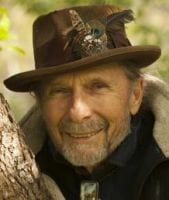 James Stark, M.A., F.E.S., is the co-director of the Regenerative Design Institute at Commonweal (RDI). He considers the programs and the garden at RDI to bea nursery for growing visions of the new era, and providing skills and tools to bring those visions to life. He co-founded and currently co-directs the Ecology of Leadership and co-founded and continues as guest instructor in the Ecology of Awakening programs which prepare community leaders for the “Great Turning” of our era. James has committed his life to exploring how we — ourselves, our communities, and our species — might move into harmony with who we are and re-ignite a deep connection with the natural world. A large part of that work is focused on cultivating vitality in all areas of our lives -physical, mental, emotional and spiritual. For decades, James dedicated himself to community visioning and organizing in Marin County. James’ years working with visioning and community development service led him to an interest in exploring how a healthy inner ecology can impact one’s work in the world. As part of that inquiry, he earned a master’s degree in Spiritual Psychology from the University of Santa Monica. Like the natural systems and patterns that guide permaculture, his work now is focused on helping others to lead from the inside out and source their lives from deep nature connection. He believes that creating a loving, peaceful inner world provides the soil for the seeds of our visions to grow in the world and lead a fully expressed life of vitality.
James Stark, M.A., F.E.S., is the co-director of the Regenerative Design Institute at Commonweal (RDI). He considers the programs and the garden at RDI to bea nursery for growing visions of the new era, and providing skills and tools to bring those visions to life. He co-founded and currently co-directs the Ecology of Leadership and co-founded and continues as guest instructor in the Ecology of Awakening programs which prepare community leaders for the “Great Turning” of our era. James has committed his life to exploring how we — ourselves, our communities, and our species — might move into harmony with who we are and re-ignite a deep connection with the natural world. A large part of that work is focused on cultivating vitality in all areas of our lives -physical, mental, emotional and spiritual. For decades, James dedicated himself to community visioning and organizing in Marin County. James’ years working with visioning and community development service led him to an interest in exploring how a healthy inner ecology can impact one’s work in the world. As part of that inquiry, he earned a master’s degree in Spiritual Psychology from the University of Santa Monica. Like the natural systems and patterns that guide permaculture, his work now is focused on helping others to lead from the inside out and source their lives from deep nature connection. He believes that creating a loving, peaceful inner world provides the soil for the seeds of our visions to grow in the world and lead a fully expressed life of vitality.Mutima Imani, MPA, provides Comprehensive Coaching to balance the Body, Mind and Spirit. In her words’”Having over two decades of supporting people into 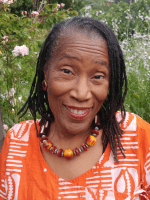 greater clarity and balance I listen to what is behind the words. I listen deeply to hear beyond the programmed mind to what the heart has to say. Everyone is gifted and has all their answers inside. I am a guide to discover what is inside, there is a place inside where one can find that is whole, perfect and complete, no matter what has happened. I enjoy the “Aha” moments people have in a session with me. The moment when self-trust is established as the mind releases blame, shame and guilt, stress in the body dissolves and the Spirit reveals the answer. As a Social Justice Visionary, Master Trainer and Facilitator working to Heal the Heart of Humanity I provide 21st Century Tools for Personal/Professional Development and Transformation. As a Global Diversity Specialist, I understand and inspire people to think locally while planning globally. I am skilled at bringing diverse groups together to resolve conflicts. I work with people conducting the Work That Reconnects workshops and Restorative Justice Circles. I have Master’s Degree in Public Administration with an emphasis in Phenomenology; I am passionate about how all things work together and what humans can learn from the natural world. I am a partner in a women-owned business – www.parcentra.com.”
greater clarity and balance I listen to what is behind the words. I listen deeply to hear beyond the programmed mind to what the heart has to say. Everyone is gifted and has all their answers inside. I am a guide to discover what is inside, there is a place inside where one can find that is whole, perfect and complete, no matter what has happened. I enjoy the “Aha” moments people have in a session with me. The moment when self-trust is established as the mind releases blame, shame and guilt, stress in the body dissolves and the Spirit reveals the answer. As a Social Justice Visionary, Master Trainer and Facilitator working to Heal the Heart of Humanity I provide 21st Century Tools for Personal/Professional Development and Transformation. As a Global Diversity Specialist, I understand and inspire people to think locally while planning globally. I am skilled at bringing diverse groups together to resolve conflicts. I work with people conducting the Work That Reconnects workshops and Restorative Justice Circles. I have Master’s Degree in Public Administration with an emphasis in Phenomenology; I am passionate about how all things work together and what humans can learn from the natural world. I am a partner in a women-owned business – www.parcentra.com.”
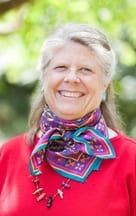 Constance Washburn, Is a a workshop leader and educator with over 35 years of experience designing programs which inspire and build deep connections toourselves, each other, and the natural world. With 40 years of Buddhist meditation practice and 25 years of yoga practice, Constance uses mindfulness and movement techniques to increase awareness and connection to our inner knowing. As a facilitator of the “Work That Reconnects”, she uses my theater background and deep nature connection to create powerful experiences for participants. Having studied with Joanna Macy for over 20 years she am steeped in the Work and able to design and deliver workshops which address a wide range of issues; climate change, racial wounds, relationship to money, elderhood and aging. For 18 years as Education Director at the Marin Agricultural Land Trust and then at Marin Organic, Constance built connections to the food and farms of West Marin as well as expanding awareness, memberships, and funding. She was part of founding the Marin Agriculture and Education Alliance in 1998 which created Marin’s first Agricultural Institute for Teachers and launched the Farm Field Studies program, providing hands-on and magical experiences on farms for thousands of K-12 students. MAEA also created a blue print for collaboration across sectors to build a local healthy food system which has been very successful in Marin County.
Constance Washburn, Is a a workshop leader and educator with over 35 years of experience designing programs which inspire and build deep connections toourselves, each other, and the natural world. With 40 years of Buddhist meditation practice and 25 years of yoga practice, Constance uses mindfulness and movement techniques to increase awareness and connection to our inner knowing. As a facilitator of the “Work That Reconnects”, she uses my theater background and deep nature connection to create powerful experiences for participants. Having studied with Joanna Macy for over 20 years she am steeped in the Work and able to design and deliver workshops which address a wide range of issues; climate change, racial wounds, relationship to money, elderhood and aging. For 18 years as Education Director at the Marin Agricultural Land Trust and then at Marin Organic, Constance built connections to the food and farms of West Marin as well as expanding awareness, memberships, and funding. She was part of founding the Marin Agriculture and Education Alliance in 1998 which created Marin’s first Agricultural Institute for Teachers and launched the Farm Field Studies program, providing hands-on and magical experiences on farms for thousands of K-12 students. MAEA also created a blue print for collaboration across sectors to build a local healthy food system which has been very successful in Marin County. 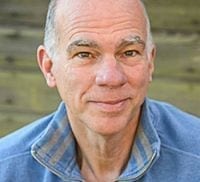
Jamie McHugh, RSMT is a Registered Somatic Movement Therapist, somatic coach, and visual artist living on the Mendocino coast. The creator of Somatic Expression® – Body Wisdom for Modern Minds, Jamie has guided somatic-expressive encounters with the natural world for the past 25 years in the United States and Europe.
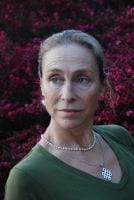
Renée Soule, PhD has been developing and teaching ecopsychology for nearly 30 years. A primary focus of her work involves engaging environmental crises as a positive, and strident impetus for human and cultural development. What do these crises invite us to become? Renée has an M.A. in Wilderness Psychology (Sonoma State University), is a trained vision quest guide (School of Lost Borders) and doctoral degree in ecopsychology (Meridian University). Beginning with extended stints in wilderness and outdoor settings, in recent years her work has branched into cultural and urban dimensions of ecopsychology. As a teacher, counselor, and life-long student, Renée engages environmental crises as an initiation presaging and promoting a new level of maturity commensurate with the challenges we face. Teaching in San Quentin for 10 years promotes her faith in the healing journey of accountability and the bright potential for ecological justice.
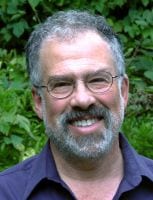 Rob Fisher, MFT is a psychotherapist, consultant and CAMFT certified supervisor in private practice in Mill Valley, CA. He is an adjunct professor at JFKUniversity and the co-developer of the Certificate Program in Mindfulness and Compassion for Psychotherapists at CIIS in San Francisco. A Certified Hakomi Trainer, Rob teaches Hakomi Mindful Somatic Psychology internationally. He is also the author of Experiential Psychotherapy with Couples, A Guide for the Creative Pragmatist, published by Zeig/Tucker, in addition to numerous articles and book chapters published in the US and abroad. Rob has been a Master and Peer Presenter at annual CAMFT Conferences, the USABP Conference, the Couples Conference and Psychotherapy Networker Conference.
Rob Fisher, MFT is a psychotherapist, consultant and CAMFT certified supervisor in private practice in Mill Valley, CA. He is an adjunct professor at JFKUniversity and the co-developer of the Certificate Program in Mindfulness and Compassion for Psychotherapists at CIIS in San Francisco. A Certified Hakomi Trainer, Rob teaches Hakomi Mindful Somatic Psychology internationally. He is also the author of Experiential Psychotherapy with Couples, A Guide for the Creative Pragmatist, published by Zeig/Tucker, in addition to numerous articles and book chapters published in the US and abroad. Rob has been a Master and Peer Presenter at annual CAMFT Conferences, the USABP Conference, the Couples Conference and Psychotherapy Networker Conference. 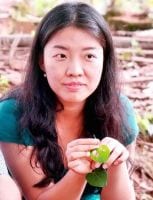 Hu Ting Ting, MA is a Mindfulness Based Stress Reduction (MBSR) teacher candidate from Beijing, China who teaches Mindfulness and the Heart of Natureworkshops with Rob Fisher. She is a co-founder of Teach for China, the largest non-profit educational agency in China. She consults to corporations in mindfulness programming, maintains a mindfulness coaching practice and teaches mindfulness in the psychology department of Beijing University. Ting Ting and Rob recently co-taught Mindfulness and the Heart of Nature workshops in the rainy, verdant jungles of southern China and near the Great Wall outside of Beijing as well as in Mill Valley, California.
Hu Ting Ting, MA is a Mindfulness Based Stress Reduction (MBSR) teacher candidate from Beijing, China who teaches Mindfulness and the Heart of Natureworkshops with Rob Fisher. She is a co-founder of Teach for China, the largest non-profit educational agency in China. She consults to corporations in mindfulness programming, maintains a mindfulness coaching practice and teaches mindfulness in the psychology department of Beijing University. Ting Ting and Rob recently co-taught Mindfulness and the Heart of Nature workshops in the rainy, verdant jungles of southern China and near the Great Wall outside of Beijing as well as in Mill Valley, California.
Continuing Education Credits This course meets the qualifications for 100 hours of continuing education credit for MFTs, LCSWs, LPCCs and LEPs as required by the California Board of Behavior Sciences. Holos Institute is approved by the California Association of Marriage and Family Therapists to sponsor continuing education for MFTs, LCSWs, LPCCs and LEPs.
Holos maintains responsibility for this program/course and its content. Holos Institute is a CAMFT Approved CEU Provider #90905 100 CEs for psychologists and RNs will be provided (pending) by the Spiritual Competency Resource Center. The Spiritual Competency Resource Center is approved by the American Psychological Association to sponsor continuing education for psychologists and by the California Board of Registered Nursing (BRN Provider CEP10318) for licensed nurses in California.
The Spiritual Competency Resource Center maintains responsibility for the program and its content. For questions about CE visit www.spiritualcompetency.com or contactDavid Lukoff, PhD at david.lukoff@gmail.com. Out of state licensees should consult their local boards to determine reciprocity.
At the completion of this program, trainees will be able to:
Describe the theoretical base of ecopsychology
List at least 3 ways that it may be directly applied
Describe an archetypal pattern of human response to the natural world
Describe ways in which Permaculture may be applied to human psychology
List the 5 most important considerations when doing outdoor psychotherapy
Describe a working model of nature-based therapy with individuals
Design and implement a nature-based exercise for group work
Assess for clinical appropriateness for ecotherapy
Describe an eco-somatic framework
Discuss and design a program to help alleviate climate change anxiety
Discuss ways in which to nurture resilience Explain considerations of diversity in environmental movement
Design a ritual process that develops hope and deepens connection to landscape
Describe at least 3 fundamental features in their landscape of origin and how that impacts consciousness
